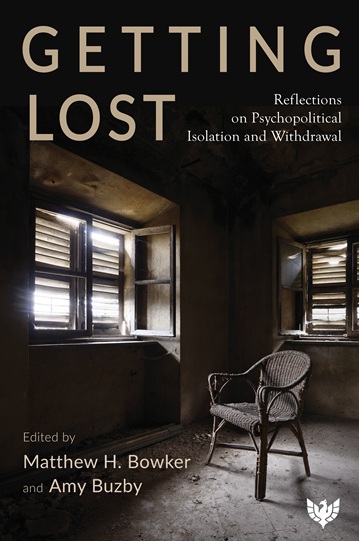Encountering Silencing: Forms of Oppression in Individuals, Families and Communities

Book Details
- Publisher : Karnac Books
- Published : April 2024
- Cover : Paperback
- Pages : 272
- Category :
Psychoanalysis - Catalogue No : 97597
- ISBN 13 : 9781800132412
- ISBN 10 : 1800132417
Also by Aleksandar Dimitrijevic
Also by Michael B. Buchholz
There are currently no reviews
Be the first to review
Encountering Silencing is an invitation to closely observe the very practices and processes of silencing used by perpetrators of abuse and totalitarian institutions alike. A carefully selected group of contributors reveal the dark side of communication that silences victims, witnesses, and perpetrators: women, religious heretics, gifted children, victims of racism, psychoanalytic dissidents, and psychiatric patients; individuals and groups, total strangers and one’s family members, as well as one own self. All of these forms of silencing are analysed with the help of literature, historiography, interviewing, archival research, and psychoanalytic and family therapy.
This book helps us to face the seemingly inevitable conclusion that silencing is everywhere in our individual and social lives, and that it is the silencing of trauma that leads to mental disorders more than trauma itself. The hope is that by opening up these topics in a considered, containing, and thoughtful way, the underlying mechanisms of trauma-related disorders will be better understood and help victims to overcome them.
Encountering Silencing is the first in a series of three books on this vital but overlooked subject.
Reviews and Endorsements
Following their brilliant book From the Abyss of Loneliness: to the Bliss of Solitude, in which they teased out the silence in which loneliness tends to germinate, the writers and co-editors Buchholz and Dimitrijević turn their magnifying glass and sound amplifiers into the eye of the storm and encounter silencing. Gathering an impressive list of contributors in their new co-edited book, Encountering Silencing, they examine meticulously the intricacies of active silencing of victims, perpetrators, and witnesses – the triad of participants in traumatic events – spreading from self-silencing to the denial and disavowal in socio-political groups and institutions of the truth about traumatic experiences. They do not shy away from facing the long tradition of silencing creative voices in the history of psychoanalysis as well. In this book, with the help of their contributors, Buchholz and Dimitrijević recognize that silencing is a human form of communication, inspired by the malignant consequence of power. They emphasize that it is the act of silencing and not the trauma per se that leads to emotional suffering and mental pain. This book does more than paint the roadmap of the processes and mechanisms involved in silencing and its consequences so we can recognize them as clinicians. It is also an invitation for all of us to sharpen our skills and expertise and nurture the courage that is needed in the important battle against acts of silencing. At the end of this book, I was left with the sensation that there is already another book in the making by this duo, a book about power that I'm already eager to read.
Ofra Bloch, psychoanalyst and filmmaker
There are few innovative concepts in psychoanalysis these days. The active, mostly unconscious intrapersonal or social imposition of silence, preventing giving voice to experience, charts a fresh and essential course through clinical and societal experience. This fascinating book explores in a multifaceted way perhaps the most fundamental of psychoanalytic ideas – why is the expression of experience in words so close to the core of what is uniquely human, and what happens when forces combine to prevent full manifestation of experience? The editors bring together some of the most sophisticated writers in our discipline to re-explore core psychoanalytic ideas through this innovative lens. The result is an outstanding, highly original, and immensely valuable collection of perspectives on what may be one of the most important ideas in contemporary psychoanalysis. A major book that is likely to become a classic contribution.
Peter Fonagy, OBE, FMedSci, FBA, PhD, Professor of Contemporary Psychoanalysis and Developmental Science, UCL; Chief Executive, Anna Freud National Centre for Children and Families, London
The editors and authors of this fabulous book complement the psychoanalytic focus on the intrapsychic dialectics of experiences included and excluded from consciousness with a focus on collective processes of experiences included and excluded from public discourse. They discuss both small (psychoanalytic associations) and large “groups" (subcultures, entire societies). The book is a crucial contribution to connecting psychological with cultural and social analyses. This volume will inspire all readers interested in understanding the psychology of collective emotions and memories.
Tilmann Habermas, Professor of Psychoanalysis, Goethe-Universität Frankfurt Am Main, Germany
In short, I am convinced that the originality, range, accuracy and seriousness that characterize all the contributions in this book are of great benefit to systemic psychotherapists in their topicality and expertise. I personally read it as an indispensable contribution to the further development of "our" theoretical and practical self-image. [...] This book is written for you, you young people, those who are young at heart and passionate thinkers! You will be thrilled.
Evelyn Niel-Dolzer, Buchrezension, August 2024 (translated from the original German)
In the first two chapters of the book, Michael Buchholz and Aleksandar Dimitrijević, partly with the assistance of literary scholar Hans-Christoph Ramm, explore "silencing" processes from the perspectives of victims, perpetrators, and witnesses in specific past or present political constellations. On the other hand, with a stylistic assurance worthy of their sources, the authors narrate and comment on stories of silencing from literature ranging from Ovid and British classics to contemporary Nigerian works. In doing so, they offer the reader an almost synesthetic experience, which evokes associations for me with the wisdom of Forrest Gump's mother ("Life is like a box of chocolates. You never know what you're gonna get.") and with the Pavlovian conditioning paradigm. Just as a child opens a candy wrapper in joyful anticipation of the sweetness, their mouth already watering at the sound of the paper crunching – I felt similarly whenever a paragraph sparked my anticipation of the detailed analysis of another literary work, full of curiosity about what awaits me this time.
Lutz Wittmann, PSYCHE, November 2025, DOI 10.21706/ps-79-11, (translated from the original German)
Table of Contents
Acknowledgements
About the editors and contributors
Introduction: silencing the traumatised and hearing silencing
Aleksandar Dimitrijević and Michael B. Buchholz
1. Silencing victims, witnesses, and perpetrators
Michael B. Buchholz, Aleksandar Dimitrijević, and Hans-Christoph Ramm
2. “But break, my heart, for I must hold my tongue”: examples of self-silencing in classical and contemporary literature
Aleksandar Dimitrijević and Michael B. Buchholz
3. Traumatic disclosures and failures of listening
Stephen Frosh
4. Racial massacres and silencing in the Deep South
Roger Frie
5. Silencing of female voices in medical history: the silenced girl who cried pain
Babette S. Gekeler
6. Silencing the voices of heretics and other religions
Uta Blohm, Aleksandar Dimitrijević, and Michael B. Buchholz
7. Silence in the classroom: suppressing (gifted) students’ curiosity and creativity
Ana Altaras Dimitrijević
8. Censorship and silencing artistic creativity
Aleksandar Dimitrijević
9. Silencing creative voices in the history of psychoanalysis
Aleksandar Dimitrijević
10. Examples of silencing in the psychotherapy office
Aleksandar Dimitrijević
11. Dream-telling in family therapy sessions: how they can change silencing into hearables
Michael B. Buchholz
12. First-person narratives of madness: the revenge of the silenced
Gail A. Hornstein
Index
About the Editor(s)
Michael B. Buchholz is professor of social psychology at International Psychoanalytic University (IPU), Berlin, Germany. He is a psychologist and social scientist and a fully trained psychoanalyst. He is head of the Doctorate Program at IPU and chair of the social psychological department. He has published more than 20 books and more than 350 scientific papers on topics like analysis of therapeutic metaphors and therapeutic conversation, including the supervisory process, and he has contributed to psychoanalytic treatment technique, theory, and history. Michael has conducted conversation analytic studies on group therapy with sexual offenders about therapeutic "contact scenarios," as well as on therapeutic empathy. His current interest is the study of therapeutic talk-in-interaction using Conversation Analysis.
More titles by Michael B. Buchholz
Aleksandar Dimitrijević, PhD, is interim professor of psychoanalysis and clinical psychology at the International Psychoanalytic University, Berlin, Germany. He is a member of the Belgrade Psychoanalytical Society (IPA) and Faculty at the Serbian Association of Psychoanalytic Psychotherapists (EFPP), and the editor or co-editor of ten books or special journal issues, as well as author of many conceptual and empirical papers, about attachment theory and research, psychoanalytic education, psychoanalysis and the arts.
Customer Reviews
Our customers have not yet reviewed this title. Be the first add your own review for this title.
You may also like
Ruptures in the American Psyche: Containing Destructive Populism in Perilous...
Michael J. Diamond
Price £17.99
save £2.00
Who Am I? Exploring Identity through Sexuality, Politics, and Art
Miguel Angel Gonzalez-Torres
Price £26.99
save £3.00
Getting Lost: Reflections on Psychopolitical Isolation and Withdrawal
Matthew H. Bowker
Price £26.09
save £2.90
Linking Objects and Linking Phenomena: A Study of the Forms, Symptoms,...
Vamik D. Volkan
Price £31.49
save £3.50










